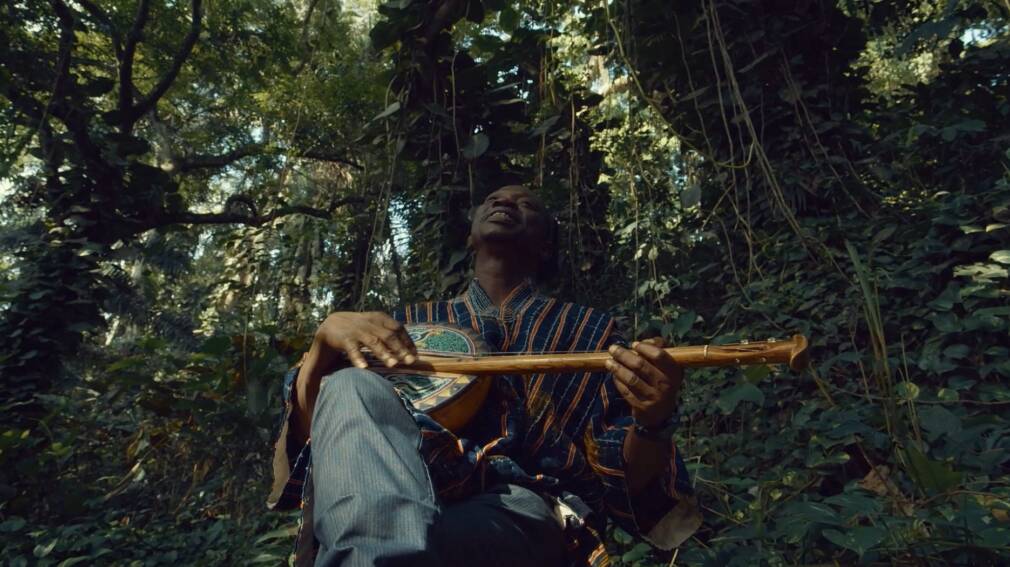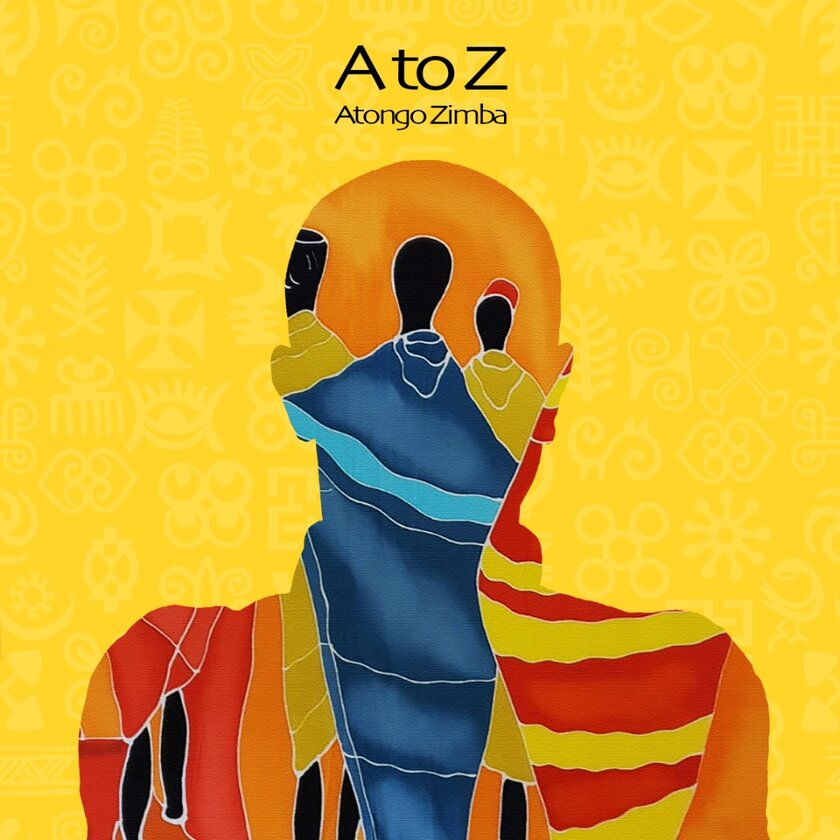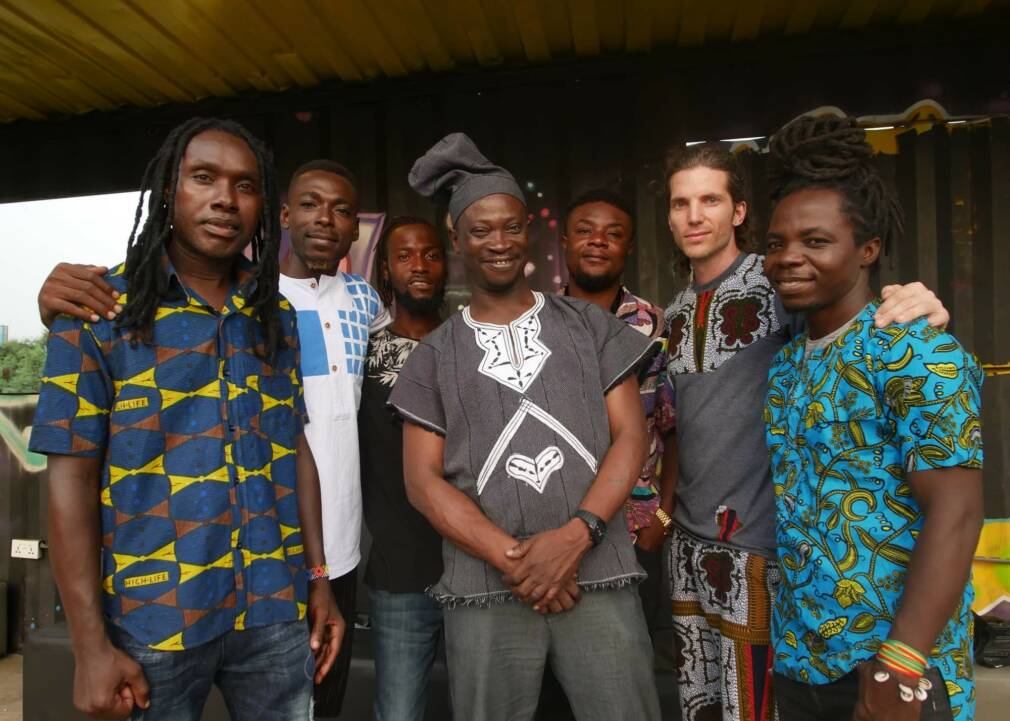The English seaside town of Brighton is a long way from the Savannahs of Northern Ghana where Atongo Zimba took his first steps before setting off with his portable two string calabash lute the Kologo, first to Accra and then along the coast to Lagos. Nonetheless, it’s from Brighton that PAM spoke to Atongo when we caught up with the artist to chat about his new album A to Z on which he sings in his powerful voice in Fra Fra, Twi, Hausa and English on subjects such as power and respect in personal and ethnic relationships, development for Ghana and Africa in general, and romantic love and spirituality.
From sensitising the youth not to litter,to earning the trust and respect of Fela Kuti for whom he was opening act at the legendary Shrine nightclub, there was much to talk about when we met on zoom.
How would you describe your instrument the Kologo and the music you play for someone who has never met the instrument or the music of Northern Ghana?
Our ancestors started out with just a calabash. We use the calabash for so many things, for food, drinking, music, storage. In the North of Ghana it is still used as the cup for the water to offer strangers, and of course it is the center of this instrument as it amplifies the two strings (Writer’s note: Atongo is also responsible for innovating the instrument by using a pick-up and introducing new strumming techniques)
Music started for me with my grandfather. When my mother and father used to go to the farm they left me and my grandfather (he was too old to go to the farm) and to stop me crying he would have me on his lap and be playing the Kologo to entertain me. I’d be looking up and laughing and that’s how I grew up. Then when I was seven or eight years old he made me a little tiny one and that’s how I started to play – just by looking. You know as a child you automatically pick up the language your parents speak, and it’s the same with music
Now in Ghana we have so many different kinds of music. I’m coming from the savanna area where we have a lot of wild animals and we love to drink milk. But in the South of Ghana they have palm wine (and palm wine music!) and they love to eat cassava. We’ve got things that they don’t eat too! So the music and the belly you see are different. We are all from Ghana, but Ghana has different kinds of music and we should recognise all of them. Ghana is for all of us.
Why the album’s title?
I’ve made this record for the youth as I believe It’s very important as a musician to think how you can share your knowledge instead of trying to pull each other down and thinking: “Oh, I want to keep this for myself.” In Ghana the current musical direction is not so much about live instruments and I wanted to show this direction. That’s why I got some young rappers on the album like M.anifest. I decided to revisit my big hit in Ghana “No beer in Heaven” but add different rhythms to catch the youth and tell them: “You can do this! You can do this even better than what I do.”
If a teacher wants to teach somebody, every teacher that comes after them has to be better than him as a teacher. And if you don’t allow that – then don’t be a teacher! So I want the young to learn something and I want them to be better than me, and to go higher, rather than be jealous.
Also on the album I have Yaw Donkor on “Akwantuo”. He is an old time rapper who raps in really deep traditional Twi. This was to show the youth that you can really do something with these traditional things. He was so happy and proud!

So the A to Z is a reference to schooling then as well as a play on your name! Was sensitising the younger generation what you had in mind when you wrote “Clean Africa”?
What inspired me is I have my friend, in fact my bass player from Switzerland who has a hotel in Ghana, and everyday I’d see him going around with the boys picking up the litter around the hotel and people are just passing by and just throwing more away! So one day when I saw people doing this I said: “Clean it up!” And then I was going to the studio so I just sat down there and wrote about what I’ve seen. I started to talk about everywhere I’ve been from Nigeria to Senegal and all this rubbish everywhere and everywhere being choked with the plastics. In Ghana we have this water called ‘pure water’ that comes in a plastic bag rather than a bottle and when people finish it they just flatten it and throw it, so everywhere is choked. Then of course it goes out to sea and ends up inside fish and you know how we love to eat fish!
So I’m saying: “We are nature too, so we can’t destroy nature!” We should make it better for our children to come and enjoy.
In terms of Pan Africanism what did you learn from the time you spent around Fela Kuti?
I must give respect to both Fela and to Mac Tontoh from Osibisa for this.
Fela Kuti saw the world in a different way. And when you see things that way then people think you are not normal! So I have some of that energy and (because like Fela I talk too much) people think I’m not normal too! If Fela was ever quiet that was when you had to be worried!
So when I met Fela I told him I was Burkinabè as you know there were problems between Ghana and Nigeria at that time, and he just said to me: “Thomas Sankara!” (he really loved Sankara). Then he said: “Play me your music.” So I took my instrument and I played my song and he just said; “Okay you are welcome here.”
I was not too grown up when I went to Lagos but here I am now sitting with grown up people!
So what I used to do was if Fela played at The Shrine on Friday and Saturday at eight o’clock – I’d be there at six o’clock opening the show and playing music whilst it filled up with a lot of tourists.
Then the band would come set up and Fela would play and I also would have the possibility to stay and listen to his music. So as a young boy, you learn something, some feeling and you know you can build your own energy. So it was interesting! The time was quite interesting.
And where next for you and your Kologo?
We’ve just come back from Porto where we were attending WOMEX. We met so many people and we’re talking to lots of festivals, so now we just have to choose! But we will definitely be busy!
A to Z by Atongo Zimba, out on all platforms.





